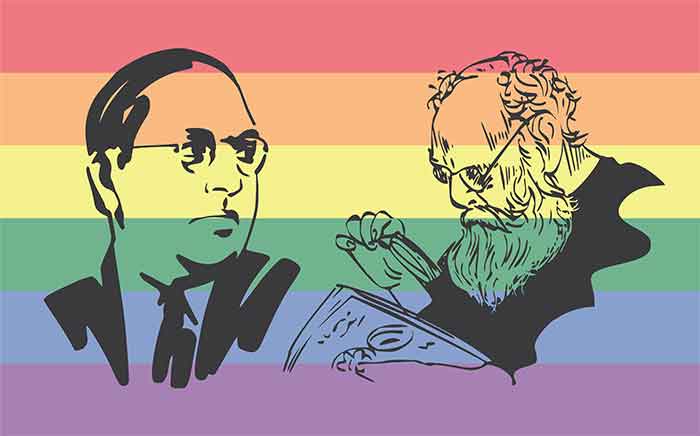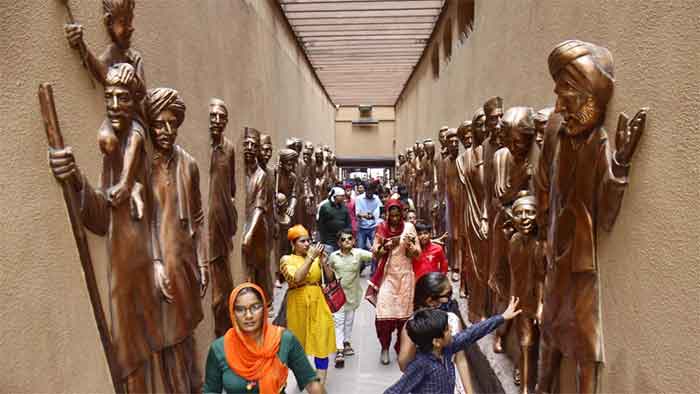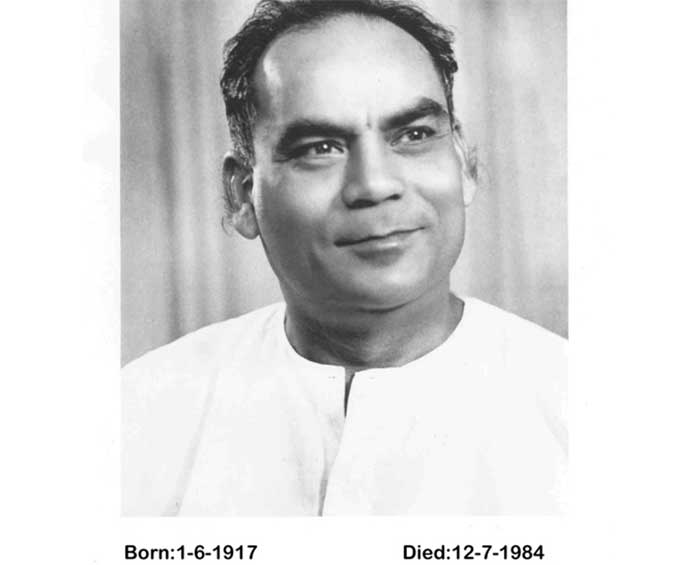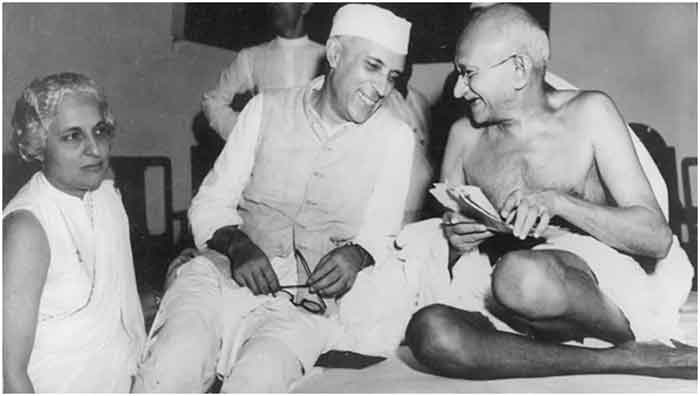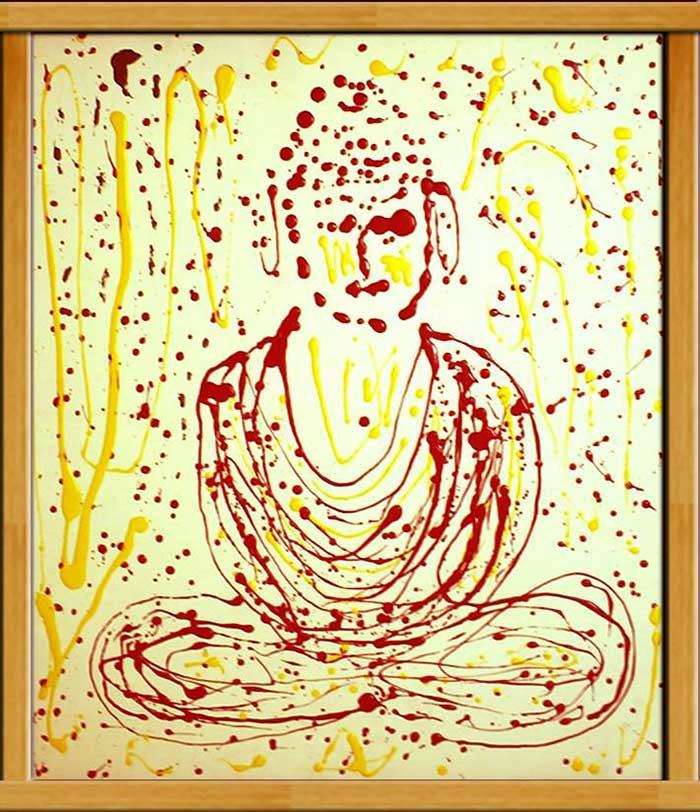
The secular and democratic India has now completed 74 years of its political journey. It is now important to deliberate and reflects on what went wrong in the experiment of Indian’s secular democratic polity. The fact cannot be denied that India had got political freedom in 1947 after the long-drawn anti-colonial struggle launched under the leadership of Mahatma Gandhi. However, after 74 years of independence still, a vast section of subaltern masses of our country are living extremely pathetic lives and deprived of getting socio-economic rights and justice in the public domain. If these contradictions will not be addressed immediately and persist further, our political freedom (for instance, electoral democracy) will in peril, as reminded by Babasaheb Ambedkar during the formative age of the nation-building. One cannot deny that our secular democracy is passing through huge challenges and seriously under attack since the PM Modi-led BJP government captured power at the Centre. In this respect, civil society, national and international human rights organizations in its reports pointed out that after the rise of Hindu nationalist forces in the wider public domain, the attack on Dalits, Tribals, women, minorities, and human rights activists has increased tremendously.
Recently several social and human rights activists who had raised their voices and remain critical of the ruling government especially of its anti-poor policies and anti-constitutional steps are treated inhumanly and called anti-national and booked under the draconian act like the UAPA. The arresting and harassments by the Delhi Police of those social activists and students who had protested against the anti-constitutional Act like CAA (Citizenship Amendment Act, 2019) peacefully can be cited as an example. Here, I am not going to give empirical details on these critical issues; it is widely available in the public domain and discussed elsewhere. Before proceeding further, let me raise here a few questions. Who is responsible for the plight of subaltern masses? Whether secular consecutive ruling governments including current ruling dispensation or people at large? Secondly, questions need to be asked here, the ruling government led by PM Modi has had done something concrete to ameliorate and improve conditions of subaltern masses so far. Finally, the question arises, what is the way forward to overcome the existing problems? These are questions that need to be deliberated and critically examined on the occasion of the 74th Independence Day, while keeping the above problems in mind.
In this piece, these questions will be discussed and critically analyzed in the light of recent two significant speeches delivered by PM Modi. First, on the occasion Dharam Chakra day event at New Delhi virtually and second, on the occasion of lying down the foundation stone of the Ram Temple on 5th August at Ayodhya. Keeping the present difficult and sad situations in mind, I have argued that Gautama Buddha’s egalitarian socio-political philosophy is more relevant to address above topical issues than the abstract and symbolic idea of the Ram Rajya put forward by the Hindu nationalists and endorsed by the PM Modi on the said occasion. Let me first briefly discuss two speeches delivered by the PM on various occasions from the perspective of subaltern masses.
While highlighting the rich legacy of India’s heritage and philosophical thoughts of the Lord Buddha, the PM Modi said that his teachings, as vividly described in the Eight-fold Path is relevant in today’s scenario and can help us to overcome the current global crisis especially in health and economy sectors amidst the Covid-19. During his earlier speeches on various occasions ( especially while addressing, the India-EU and UN global meet recently), the PM has also underlined that India believes and committed to promoting universal values like democracy, pluralism, multilateralism, inclusivity, ‘human-centric globalization’ and peace to enhance trade, investments through promoting cultural exchanges among the nations. While addressing on the occasion of laying down the foundation of the Ram temple and Bhumi Pujan(ground-breaking ceremony), the PM has broadly reiterated these points and said that we need to draw inspirations from Lord Ram especially his idea of the Ram Rajya to achieve the agenda of Sabka sath, sabka Vikash, sabka vishwash and Atma Nirbhar Bharat.
The construction of the Ram temple was considered by the BJP-RSS combined as the end of the historical burden and slavery of medieval India. The building of the “Grand Temple” is being considered by the Hindu Right as the beginning of the ‘Hindu Renaissance’ and the era of prosperity. However, the PM Modi Speech at Ayodhya has been sharply criticized by Left, progressive academic and activist circles. In this respect, a section of scholars said that the PM -especially while participating in rituals at Ayodhya- has damaged the secular and democratic character of India. Moreover, this initiative which was taken by him is considered as the contrary to democratic and progressive values enshrined in the Constitution of India and scientific temperament. While holding a constitutional position, scholars have commented that the PM is not supposed to participate in the Bhumi Pujan (ground-breaking ceremony) and perform rituals at Ayodhya by invoking the Lord Ram as a historical symbol.
Contrary to the Hindu Right, some social scientists have argued that instead of constructing more and more Temples or Masques, the ruling government must concentrate on building secular institutions like hospitals and Schools in the civil society, amidst threat of the COVID-19 pandemic. Let me clarify here that my intention is not to hurt religious sentiments whether belong to the Hindus or Muslims. I still uphold the view that religion as “Faith” is acceptable for me and must be respected in the public domain but over-politicization of religious identities to generate communal sentiments with having political motives, need to be questioned.
Having said that let me raise here some critical issues which are still unsettled such as whether the Lord Ram is a historical or mythical figure? Second, the Ram temple movement (which resulted in the demolition of Babri Masjid in 1992 followed by riots in several parts of our country) was seen by progressive-minded historians as an anti-constitutional act which had damaged and tarnished image of India’s secular and inclusive legacy, as envisioned by Gandhi, Nehru, Azad, and Babasaheb during the course of anti-colonial struggle and the freedom movement. Third, where was Lord Ram born in Nepal or India and elsewhere? Finally which versions of Ramayana is correct one, for instance, Tulsidas and Valmiki or Buddhist one?
At the outset, let me say that I am not going to touch these contentious issues here. In this respect, thousand of the pages have been so far written in the Economic and Political Weekly and elsewhere by secular-minded political scientists, sociologists, and historians of our country. My concern will be limited to the PM Modi’s speech delivered on two crucial occasions. First, on the occasion of Dharam Chakra day, virtually addressed by the PM at New Delhi recently in which he highlighted the relevance of Buddha especially his Eight Fold Path. Second, he delivered his speech on 5th August while directly participating in Bhumi Pujan (ground-breaking ceremony) programmes which have now become bone of contentions and widely criticized by the Left-liberal academic circles. These steps were taken by the PM Modi has been seen by the liberals to damage and tarnish the image of Hinduism by colonizing it. However, a section of liberals has interpreted Hinduism as the religion which is historically based on pluralism, diversity, and tolerance and should not be over-politicized unnecessarily to consolidate the Hindu community with having political motives.
In this piece, I will limit myself to the PM Modi’s speech on two occasions as stated above. While doing so, I argued that the Buddha’s concept of egalitarian political philosophy is more relevant than the abstract notion of the Ram Rajya. Unlike the Hindu Right, the concept of the Ram Rajya as envisioned by Mahatma Gandhi was based on egalitarian values and committed to the welfare of people irrespective of caste, creed, and religion by adopting non-violent means. However, the manner in which Hindu nationalist forces have narrowly conceived the Ram Rajya (by invoking majoritarian symbols and religious sentiments of gullible masses) is contrary to Gandhi’s secular vision and legacy of the freedom movement too. Nonetheless, I am not going to enter into communal vs. secular or majority vs. minority discourse here; my concern will be limited to highlight the Buddha’s notion of egalitarian values, as practiced in Sangha in the 6th century BC.
In what follows, I have argued that Buddha’s concept of state, democracy, rights, and social justice is more inclusive and relevant in the current political scenario rather than the Ram Rajya, narrowly conceived by the Hindu nationalist forces. These egalitarian values mentioned above were practiced in the Sangha irrespective of caste, creed, religion, and gender. However, it is not clearly pointed out by the Hindu Right how the idea of the Ram Rajya will address the questions of caste, social hierarchy, Varna system, and gender discriminations, as experienced by lower caste/class strata of Indian society. In this respect, Buddha had provided solid and concrete programmes, to how can ‘annihilate caste’ and fight against patriarchal values along with addressing material issues, as compared to the Lord Ram and other ancient thinkers. The point is also highlighted by a noted public intellectual like Kancha Ilaiah’s book titled, “God as Political Philosopher: Buddha’s Challenge to Brahmanism”, 2019. Before making comments on the PM’s speech delivered at Ayodhya, let me highlight what he had said about Buddha while addressing the Dharma Chakra day at New Delhi recently.
To be precise here, while addressing on the said occasion, the PM Modi has stressed the need for paying serious attention to the Lord Buddha’s egalitarian teachings, as mentioned in his Eight-Fold Path. In this respect, the PM underlined that the Lord Buddha had long back taught us universal values and respect for underprivileged and poor. “Respect for people. Respect for the poor. Respect for women. Respect for peace and non-violence”, PM Modi added. While addressing in 2019 at the United Nation, he said that country like India has given ‘Buddh’ (it refers to Gautama Buddha whose teachings was based on values like peace, non-violence, and humanity, the emphasis is mine) and not ‘Yuddh’ (war) to the world community. Finally, the PM said that Lord Buddha’s universal teachings are not relevant only in the context of India but also to humanity at large, amidst the COVID-19. To explain point further, PM Modi has said:
“Today the world fights extraordinary challenges. To these challenges, lasting solutions can come from the ideals of Lord Buddha. They were relevant in the past. They are relevant in the present. And, they will remain relevant in the future”.
On the basis of the above points, one could say that the PM himself has accepted the importance of Buddha and underlined his progressive message in the public domain.
Having said that let me come to the PM Modi’s Speech delivered on 5th August 2020, at Ayodhya. While addressing his speech, he mentioned the name of Buddha, Mahatma Gandhi and highlighted the significance of the Lord Ram amidst the COVID-19 pandemic. However, if you analyze Gandhi and Buddha’s political and social philosophy seriously in the proper historical context, one can say that both great personalities of our country in their public lives had secular orientation and committed to addressing the concern of masse irrespective of caste/class, religion, and gender.
For the secular and scientific community, it is unpersuasive to say that the grand Ram temple construction will bring out prosperity, development, and benefit to the larger humanity by realizing the goal of the Ram Rajya. It is not clearly underlined by the PM and Hindu nationalist forces especially on what will be the place of Sudras, Women, and minorities in the Ram Rajya. While Lord Buddha had clearly pointed out in his Sangha that there will be no discriminations on the basis of caste, creed, and gender. Historically speaking, Buddha was not saint and religious thinker as put forward by the Hindu nationalist scholars to appropriate him within the fold of Hinduism. To exposing the misinterpretations done by the Sangh Privar, llaiah writes in his introductory chapter:
“Scholars treated Gautama Buddha as a saint and religious thinker and not as revolutionary or a political theorist. The responsibility for cooption and distortion lies with colonial as well as nationalist scholars. During the nationalist period except Mahatma Jyotirao Phule and Dr. B.R. Ambedkar all scholars of philosophy treated Buddhism as part of Hinduism”. (See Ilaiah, God as Political Philosopher, P-2)
While further exposing the motive of communal forces to appropriate Buddha especially when historians said that most of the temples were earlier Buddhist shrines, Ilaiah writes in his footnote:
“In 1989 when the controversy over the Ram Janmabhoomi and Babri Masjid arouse, Hindu communal elements stated arguing that Buddhism was not a separate school but part of Hinduism. They put forth this argument because some progressive Indian historians raised that as a majority of so called Hindu temples were old Buddhist shrines, the Hindus (that is, the Vishwa Hindu Parishad,), should allow the Buddhists to take them back. In retaliation, Hindu communal forces started claiming Buddhism to be indivisible from Hinduism”, (Ibid., p-98)
While addressing on the occasion of the 74th Independence Day, 2020 from the Red Fort today, PM Modi has reiterated that the long-standing Ayodhya disputes has been resolved legally and in a peaceful manner. However, while critically reflecting on the Ram Temple movement launched by the Hindu nationalist forces since the late 1980s; Secular- minded historians have said that the demolition of Babri Masjid is a blot on a secular democracy and shaken the basic foundation of the democratic Constitution of India.
Let me conclude this piece with a positive note on the occasion of the 74th Independence Day 2020. If the ruling government led by PM Modi is really committed to the own slogans like Atma Nirbhar Bharat (as the PM has also once again reminded to people of India while addressing the occasion of the 74th Independence Day, 2020), sabka saath, sabka vikash and sabka viswash and appeasement of none and development of all; must adopt the Buddha’s egalitarian path which was also endorsed by Babasaheb Ambedkar in his writings on Buddha and during the course of the making of the Indian Constitution. To note that Babasaheb said that the concept of parliamentary democracy is much closer to the notion of democratic Sangha as practiced during the lifetime of Buddha in the 6th Century BC. For Ambedkar, the idea of equality, liberty and the fraternity was taken by my master Lord Buddha rather than the ‘French Revolution’. In short, one cannot deny the fact that the makers of modern India like Nehru, Gandhi, Ambedkar, and Azad who participated in the freedom movement under the leadership of Gandhi was heavily influenced by Buddha’s egalitarian political philosophy. Let me end by saying that on the occasion of the 74th Independent Day 2020, secular democratic India needs to adopt an egalitarian path of Buddha (especially mentioned in his Eight-Fold Path) to address the concern of the toiling masses rather than abstract and the symbolic idea of the Ram Rajya in days to come.
The author is a Research Scholar at the Department of Political Science, Delhi University
SIGN UP FOR COUNTERCURRENTS DAILY NEWSLETTER



